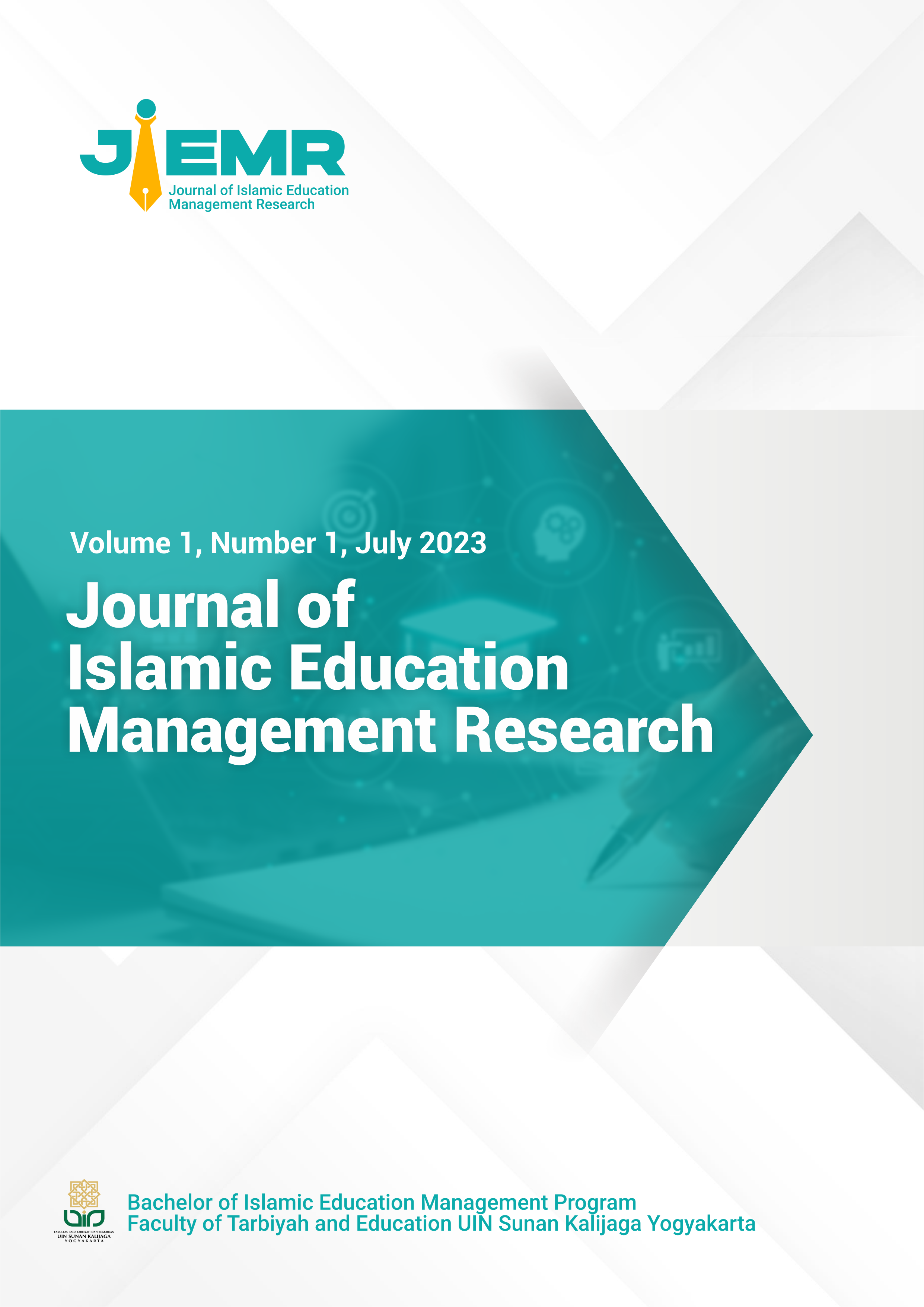Implementing the Teaching Factory Approach: Curriculum Management at MAN 2 Bantul, Yogyakarta Indonesia
DOI:
https://doi.org/10.14421/jiemr.2023.11-03Keywords:
Curriculum, Management, Modified Teaching Factory, SkillsAbstract
Purpose – This research aims to explore the implementation of curriculum management in skill-based subjects using the modified teaching factory approach at MAN 2 Bantul. The study examines the planning, development, and execution of curriculum management in the context of skill-based programs.
Design/methods/approach – Conducted as a qualitative study, this research utilizes a case study approach to delve into the intricacies of curriculum management. Data collection techniques include observation, in-depth interviews, and documentation. Analysis methods involve transcript analysis, coding/labeling, grouping, comparing and contrasting, and interpretation. Data validation employs triangulation, considering multiple sources, techniques, and periods.
Findings – The findings of this research indicate several vital points: 1) Curriculum management planning in the skills program is aligned with the institution's vision, mission, and objectives. 2) Curriculum development is tailored to students' needs and the educational institution's capabilities. 3) Implementing curriculum management in the skills program involves using the modified teaching factory method with block system learning strategies. 4) Evaluation stages include both learning and curriculum evaluations. 5) Challenges the institution faces in implementing skill programs include the novelty of the learning model, aligning existing skill programs with community needs, a shortage of educators in skill programs, marketing products, and addressing student issues.
Research implications/limitations – The impact of this research extends to educational policymakers and practitioners, providing insights into effective curriculum management for skill-based programs. Rules include the specific context of MAN 2 Bantul and the challenges faced by the institution.
Practical implications – The study offers valuable insights for educational institutions implementing skill-based programs using the modified teaching factory approach. The findings highlight effective strategies and potential challenges institutions may encounter during implementation.
Originality/value – This research contributes to the literature by examining curriculum management in skill-based programs, explicitly using the modified teaching factory method. The study's originality lies in its comprehensive analysis of the planning, development, and implementation phases, providing valuable lessons for institutions seeking innovative approaches to curriculum management in skills education.
References
Alfan Makmur, M. (2020). Madrasah Vokasi Bidang IT Menyongsong revolusi industi 4.0 menuju Madrasah Hebat dan Bermartabat di MAN 2 Kota probolinggo. Pedagogy, 07(01), 6–10.
Chauhan, A., Sinha, R., Kanungo, S., Nayak, S., Samantaray, K., Chokshi, M., Mokashi, T., Nair, A., Mahapatra, P., & Pati, S. (2022). Assessment of the Teaching on Alcohol Use and Management in Current Health Professional Curricula in India. Journal of Health Management, 24(1), 160–168. Scopus. https://doi.org/10.1177/09720634221078068
Jannana, N. S., & Suryono, Y. (2017). Manajemen program short courses. Jurnal Akuntabilitas Manajemen Pendidikan, 5(1), 82. https://doi.org/10.21831/amp.v5i1.9795
Kuat, T. (2017). Penumbuhan Jiwa Kewirausahaan melalui Implementasi Edupreneurship di Sekolah Menengah Kejuruan. Seminar Nasional Pendidikan 2017 (SNP 2017), 130–143.
Liliana. (2020). Manejemen Kurikulum dan Pembelajaran Era Disruptif. Seminar Nasional Pendidikan PPs Universitas PGRI Pemalang, 507–516.
Machali, I., & Haamid, N. (2017). Manajemen Pendidikan Islam.
Mestry, R., & Govindasamy, V. (2021). The Perceptions of School Management Teams and Teachers of the Principal’s Instructional Leadership Role in Managing Curriculum Changes. Interchange, 52(4), 545–560. Scopus. https://doi.org/10.1007/s10780-021-09425-5
Nasbi, I. (2017). Manajemen Kurikulum: Sebuah Kajian Teoritis. Idaarah: Jurnal Manajemen Pendidikan, 1(2), 318–330. https://doi.org/10.24252/idaarah.v1i2.4274
Patphol, M. (2022). DEVELOPING A TRAINING CURRICULUM USING PROFESSIONAL LEARNING COMMUNITY FOR ENHANCING TEACHERS’ LEARNING MANAGEMENT SKILLS TO PROMOTE STUDENTS’ CREATIVITY AND INNOVATION ABILITY: A CASE STUDY OF THAI TEACHERS. Creativity Studies, 15(1), 199–216. Scopus. https://doi.org/10.3846/cs.2022.13278
Prasetya, B. (2020). Manajemen Teaching Factory Pada Era Industri 4. 0 di Indonesia. Jurnal Bisnis & Teknologi, 12(01), 12–18.
Sr, E. T. (2020). Desa Net , Eksistensi Kelas Industri Dengan Layanan Internet Sebagai Konsep Pengembangan Teknologi Untuk Pemberdayaan Masyarakat Sekitar Sekolah. Jurnal IT CIDA, 6(1), 21–32.
Suardipa, P., & Priyamana, K. H. (2020). Peran Evaluasi Pembelajaran untuk Meningkatkan kualitas pemebelajaran. Widyacarya, 4(2).
Syafaruddin, & Amiruddin. (2017). Manajemen Kurikulum. In Perdana Publishing (Issue 2).
van Hooft, S. M., Becqué, Y. N., Dwarswaard, J., van Staa, A., & Bal, R. (2018). Teaching self-management support in Dutch Bachelor of Nursing education: A mixed methods study of the curriculum. Nurse Education Today, 68, 146–152. Scopus. https://doi.org/10.1016/j.nedt.2018.06.005
Yunanto, D. (2016). Implementasi Teaching Factory di SMKN 2 Gedangsari Gunungkidul. Vidya Karya, 31(1), 29–36. https://doi.org/10.20527/jvk.v31i1.3971
Yus’ad afandi, A. (2019). Implementasi Teaching Factory Di SMK YPM 8 Sidoarjo. Seminar Nasional Dan Aplikasi Teknologi Di Industri, 7–11.
Zain, R. (2020). Olah Data Kualitatif. E-Learning.Uin-Suka.Ac.Id.
Zhao, Y., Y., Lee, Y.-T., & Chen, L. (2020). Cumulative interpersonal relationship risk and resilience models for bullying victimization and depression in adolescents. Personality and Individual Differences, 155. Scopus. https://doi.org/10.1016/j.paid.2019.109706
Downloads
Published
Issue
Section
License
Copyright (c) 2022 Friska Mawaddah Friska, Nora Saiva Jannana

This work is licensed under a Creative Commons Attribution-NonCommercial-ShareAlike 4.0 International License.
Copyright Notice
Authors who publish with this journal agree to the following terms:
- Authors retain copyright and grant the journal right of first publication with the work simultaneously licensed under a Creative Commons Attribution-ShareAlike 4.0 International License that allows others to copy and redistribute the material in any medium or format with an acknowledgement of the work's authorship and initial publication in this journal and also allows to remix, transform, and build upon the material for any purpose, even commercially with contributions under the same license as the original.
- Authors are able to enter into separate, additional contractual arrangements for the non-exclusive distribution of the journal's published version of the work (e.g., post it to an institutional repository or publish it in a book), with an acknowledgement of its initial publication in this journal.
- Authors are permitted and encouraged to post their work online (e.g., in institutional repositories or on their website) prior to and during the submission process, as it can lead to productive exchanges, as well as earlier and greater citation of published work.









